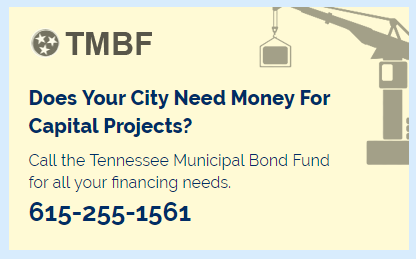Comptroller’s Office Creates IMPROVE Act Project Maps for Tennessee’s General Assembly
The Comptroller’s Office of Research and Education Accountability (OREA) has released individualized maps illustrating where road and bridge projects identified in the Improving, Manufacturing, Public Roads and Opportunities for a Vibrant Economy Act (IMPROVE) will take place across each legislator’s district.
The maps are designed to supplement the IMPROVE Act report released by the Comptroller’s Office of Research and Education Accountability on July 10, 2017, which provides more information about the various aspects of the new law.
Use the links below to access House and Senate district maps of identified transportation projections.
The IMPROVE Act is now law.
Click here to see TML's analysis of its estimated impact on your municipality.
The IMPROVE Act will phase in additional fuel taxes over the next three years, ultimately increasing the gasoline tax by 6 cents per gallon and the diesel and motor fuels tax by 10 cents per gallon. This is offset by a 1% reduction in the sales tax on food. The Hall income tax is also continuing to be phased out over the next 5 years with full 1% reductions each year until the tax is eliminated.
The effect of these tax changes are different for each city. State shared sales taxes remitted to municipalities are general fund revenues and are being reduced in some cities because of the sales tax cut on food. The increase in revenues from fuel taxes are limited to use on transportation needs.
Legislative History:
Update 3/17/17
This past week the Governor's IMPROVE Act legislation was amended in the Senate Transportation committee. Among the changes included in the amendment is a reduction to the sales tax on groceries of 4 percent, a 6 cents per gallon increase to the gas tax, and 10 cents per gallon increase on diesel. The gas and diesel tax increases would be phased in over three years. For the upcoming 2017-18 fiscal year, the gas tax would be increased by 4 cents. In each subsequent fiscal year it would increase by 1 cent. The diesel tax would be increased by 4 cents in the upcoming fiscal year and would be hiked in the following fiscal years before maxing out at 27 cents in fiscal year 2019-20. Unlike the phased-in approach on the gas and diesel taxes, the decrease in the state's sales tax would be immediate. The cuts to the tax on groceries would result in a $120 million reduction in revenue for the state. The money that would be raised through the tax increases would provide about $250 million for the state, $35 million for cities and $70 million for counties once the plan is fully phased in, said Stephen Smith, a policy adviser for the governor.
Use the links below for more information:
Highway Fund Allocations (chart)
Fiscal Impact of Amended IMPROVE Act (chart)
Additional Transportation Materials:
After you speak to your legislators inform TML of their position TDOT's Statewide Project Overview Tracker
Highlights of Dr. Laffer's Testimony to the Transportation Subcommittee – YouTube video
UT Study Evaluating Options for Funding Tennessee's Infrastructure Needs
House Transportation Subcommittee Video Stream
Governor Haslam Announces New Transportation Funding Plans
Tennessee Gov. Bill Haslam announced a comprehensive and strategic plan to cut taxes on food and manufacturing while updating how the state provides Tennesseans the safe and reliable transportation network needed to support future job growth. The IMPROVE Act, “Improving Manufacturing, Public Roads and Opportunities for a Vibrant Economy,†is the first piece of Haslam's NextTennessee legislative plan, policy proposals aimed at building and sustaining economic growth and the state's competitiveness for the next generation of Tennesseans. “Under the conservative fiscal leadership of the General Assembly and this administration, state government is smaller, $500 million in recurring costs have been cut out of the state's operating budget, and together we've cut taxes by $270 million annually,†Haslam said. “Because we are a smaller, less tax reliant state government, it is time to build on the vision of what the future of Tennessee looks like and requires. This proposal is the next step in the conversation about how we're going to position the state to address expected growth, maintain Tennessee's economic momentum and remain competitive as we continue recruiting high quality jobs.†The IMPROVE Act includes a transportation plan that keeps Tennessee a pay-as-you-go state and its roads debt free. Tennessee last addressed how it funds its roads and bridges in 1989 when it raised its fixed tax rate to 21.4 cents per gallon, creating a transportation network that spurred the economic growth the state has seen during the last three decades. Due to inflation, increases in construction costs and the cost of land and better gas mileage, the state comptroller estimates that 21.4 cents in 1989 is now worth approximately 11 cents a gallon. The IMPROVE Act increases the road user fee by 7 cents for a gallon of gas and 12 cents for a gallon of diesel and increases car registration fees by $5 for the average passenger vehicle. It places an annual road user fee on electric vehicles and increases charges on vehicles using alternative fuels. The proposal also includes a 3 percent charge on rental cars and changes the state's open container law to allow the Tennessee Department of Transportation flexibility to use $18 million in existing federal dollars on roads. Fuel taxes would be indexed – but also capped – to the Consumer Price Index in order to keep up with the rate of inflation. The IMPROVE Act would bring in $278 million in new dollars to the state for projects while limiting the impact on the average Tennessee motorist to approximately $4 a month. All funds would go toward transportation, including the 2 percent typically reverted to the General Fund, to provide funding for 962 projects across all 95 counties plus an additional $39 million to cities and $78 million to counties. The legislation would also allow municipalities, only if approved by local voters through referendum, to impose a surcharge on their sales tax rate that would be solely dedicated to public transit projects. The governor also announced that his FY 2017-2018 budget proposal would use surplus one-time funds to finish repaying the Highway Fund by transferring $120 million from the General Fund. “We've lowered the cost of government and experienced revenue growth so we're lowering the cost of food and bringing business taxes on manufacturers more in line with our neighbors. At the same time we have to ensure we have a transportation network that is not only highly ranked but also debt-free, just like it was given to us,†Haslam added. “Together these proposed tax cuts and investments will move the state forward and position the next Tennessee for continued growth, prosperity and opportunity for our children and grandchildren.â€
Links to other materials related to Governor Haslam's proposed transportation plan are posted above.
Governor Haslam's Transportation and Infrastructure Tour
Governor Haslam concluded his tour of the state with TDOT Commissioner John Schroer in which they discussed the state's transportation and infrastructure needs and what options the state has to fund the multi-billion dollar backlog of needed projects. The Governor and Commissioner Schroer listened to what local residents think their needs are and presented a list of what the state thinks the local needs are. The tour began August 5 in Memphis and concluded in Lenoir City September 10.
Transportation Coalition Tour
The Transportation Coalition of Tennessee is giving presentations across the state to discuss sustainable, long-term solutions for funding our infrastructure needs.
TML is one of several other organizations on the coalition's steering committee, including the Tennessee Infrastructure Alliance, Auto Club Group/AAA Tennessee, Tennessee Public Transportation Association, Tennessee Trucking Association, Tennessee County Highway Officials Association, American Council of Engineering Companies of Tennessee, and Tennessee Road Builder's Association. It is extremely important that our municipal officials attend these meetings.
Transportation Coalition of Tennessee
A statewide coalition has launched to educate the public and state legislators as it seeks to increase and reform Tennessee's transportation fees. The coalition aims to recruit other interested parties to join in seeking a comprehensive funding solution to maintain and expand Tennessee's critical transportation system.
TML joins the Tennessee Infrastructure Alliance, Auto Club Group/AAA Tennessee, Tennessee Public Transportation Association, Tennessee Trucking Association, Tennessee County Highway Officials Association, American Council of Engineering Companies of Tennessee, and Tennessee Road Builders Association, as a steering committee member for the coalition.
The Comptroller's report is thorough and comprehensive. It outlines the problems and offers potential solutions, including increased fuel tax, variable and indexed fuel tax rates, increased vehicle registration fees, weight-distance tax, tolls, and general funds.
Included in the links above is a study of transportation funding by Comptroller Justin Wilson's office. In a Joint Transportation Committee Meeting on February 11, 2015, the Comptroller's office presented the findings of their study, including:
There is a growing gap between transportation infrastructure needs and funding • This gap is caused by a number of factors:
- Declining purchasing power of Tennessee's 21.4 cent per-gallon gas tax (current revenue funding)
- A funding mechanism that has remained unchanged since 1989
- Increase in population (up 14% since 2000) bringing more roads and highways
- Increased fuel efficiency of vehicles
- Increased use of alternative-fuel vehicles, such as electric vehicles, which are not currently subject to highway fuel taxes
The Comptroller's report is thorough and comprehensive. It outlines the problems and offers potential solutions, including increased fuel tax, variable and indexed fuel tax rates, increased vehicle registration fees, weight-distance tax, tolls, and general funds. Tennessee has been extremely fortunate. TDOT has been efficient in expenditures of dedicated revenues for transportation projects. Out of every transportation revenue dollar, 91 percent is returned to fund new state projects, maintain existing projects, and fund grants for local and county governments for existing projects. Maintaining the quality of our roads and bridges is an investment in our state's future. Good transportation infrastructure means safer roads and bridges for our residents and visitors to drive on and is a key factor in economic development.



